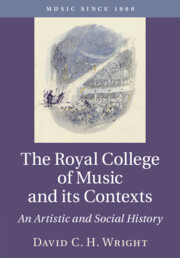Book contents
- The Royal College of Music and Its Contexts
- Music Since 1900
- The Royal College of Music and Its Contexts
- Copyright page
- Dedication
- Contents
- Figures
- Tables
- Acknowledgements
- Notes on the Text
- Abbreviations
- Introduction
- Part I Building and Consolidating (1883–1914)
- Part II Renewal and Conventionality (1919–1960)
- Part III Changing Musical Cultures (1960–1984)
- Part IV Into Its Second Century, 1984–2018
- Epilogue
- Works Cited
- Index
Introduction
Beginnings and Contexts, the Themes of a History
Published online by Cambridge University Press: 26 August 2019
- The Royal College of Music and Its Contexts
- Music Since 1900
- The Royal College of Music and Its Contexts
- Copyright page
- Dedication
- Contents
- Figures
- Tables
- Acknowledgements
- Notes on the Text
- Abbreviations
- Introduction
- Part I Building and Consolidating (1883–1914)
- Part II Renewal and Conventionality (1919–1960)
- Part III Changing Musical Cultures (1960–1984)
- Part IV Into Its Second Century, 1984–2018
- Epilogue
- Works Cited
- Index
Summary
The Introduction provides the background that led to the founding of the RCM. It argues that its vision came out of the musical achievements of August Manns and George Grove at the Crystal Palace at Sydenham, which hosted London’s first permanent concert orchestra. It suggests that the long-established trope of the ‘English Musical Renaissance’ gives a misleadingly composer-centric view of the late Victorian British musical condition, which ignores the vitality of the different participative musical cultures of the time, such as brass and wind bands or choral singing. It demonstrates how different Grove’s conception of the RCM was from the then-failing RAM in providing a complete and systematic musical training. It relates the attraction of the RCM’s education to the fact that examined accreditation for music teachers (the ARCM) was now a worthwhile professional investment. The Introduction presents one of the book’s central arguments, that from a national perspective, the College is as important for its students who worked to raise musical standards locally as for its star performers and composers.
Keywords
- Type
- Chapter
- Information
- The Royal College of Music and its ContextsAn Artistic and Social History, pp. 1 - 24Publisher: Cambridge University PressPrint publication year: 2019

